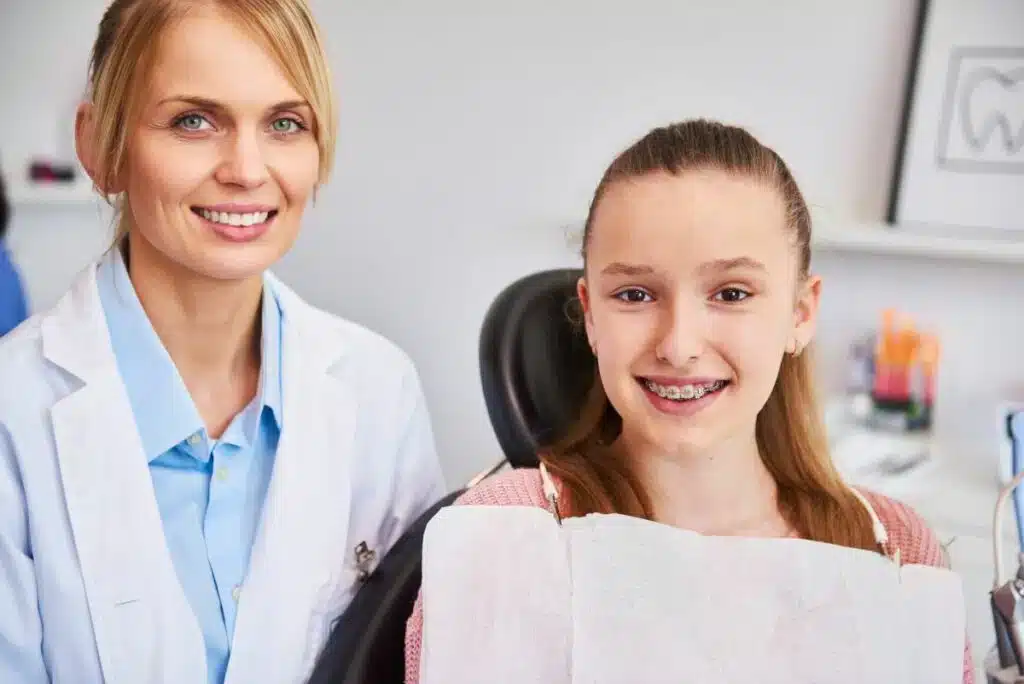Rumored Buzz on Causey Orthodontics
Rumored Buzz on Causey Orthodontics
Blog Article
Causey Orthodontics - The Facts
Table of ContentsNot known Details About Causey Orthodontics The Best Guide To Causey OrthodonticsThe Main Principles Of Causey Orthodontics 5 Easy Facts About Causey Orthodontics ExplainedCausey Orthodontics - TruthsThe Basic Principles Of Causey Orthodontics 6 Simple Techniques For Causey Orthodontics
What is the difference in between a dental expert and an orthodontist? All dental practitioners, including orthodontists, deal with the teeth, gums, jaw and nerves.
Orthodontists and dental professionals both provide oral look after people. Orthodontists can operate in an oral workplace and offer the same therapies as various other dental professionals. So you can consider both medical professionals that treat periodontal and teeth troubles. The major difference is that coming to be an orthodontist requires a particular specialty in treating the misalignment of the teeth and jaw.
Causey Orthodontics Fundamentals Explained
An orthodontist is a dental expert that has gone through training to focus on the medical diagnosis, avoidance and therapy of irregularities in the jaw and teeth. Their training consists of dealing with these existing conditions. They can additionally identify prospective issues in teeth positioning that might create when conditions are left unattended. Orthodontists can assist people of any ages.
This includes all the required education to come to be a basic dentist. According to the American Student Dental Organization (ASDA), it implies you will require to have either a Medical professional of Medication in Dental Care (DMD) or a Physician of Oral Surgery (DDS). To put it simply, orthodontists need to complete dental school and after that get an orthodontics specialized education and learning.
Some orthodontists also obtain their masters in craniofacial biology. These programs concentrate on two details locations or disciplines: Dentofacial Orthopedics: This research study concentrates on assisting teeth and jaw advancement.
The Best Strategy To Use For Causey Orthodontics

 These include device such as dental braces, retainers and Invisalign. So, what does an orthodontist do, and what do they focus on? The general goal of an orthodontist is to enhance an individual's bite. Not everyone is born with straight teeth, and an orthodontist will guarantee that patients obtain uniformly spaced straight teeth.
These include device such as dental braces, retainers and Invisalign. So, what does an orthodontist do, and what do they focus on? The general goal of an orthodontist is to enhance an individual's bite. Not everyone is born with straight teeth, and an orthodontist will guarantee that patients obtain uniformly spaced straight teeth.
Facts About Causey Orthodontics Uncovered
The American Association of Orthodontists recommends your initial check up by age 7. You'll need to see your orthodontist if you have a misalignment in your teeth, likewise called malocclusion. If you discover uneven bite patterns, a somewhat askew jaw, or when your teeth are overcrowded, you will likely need orthodontic therapy.
In enhancement, we use flexible treatment schedules, adaptable settlement alternatives and an enjoyable, delightful experience.
An orthodontist is a dental practitioner trained to diagnose, stop, and treat teeth and jaw abnormalities. Orthodontists work with people of all ages, from children to grownups (https://www.racked.com/users/causeyortho7).
Get This Report on Causey Orthodontics
Malocclusion, or misaligned teeth, can bring about dental issues, consisting of dental cavity, gum condition, and difficult or agonizing chewing. Not everyone is born with straight teeth. If you have a poor bite or large areas in between your teeth, you might wish to seek advice from a dental professional concentrating on orthodontic treatment.
(Image Credit Rating: DigitalVision/Getty Images) Orthodontists utilize dealt with and detachable oral tools, like braces, retainers, and bands, to alter the setting of teeth in your mouth. Orthodontic treatment is for dental abnormalities, including: Uneven teethBite issues, like an overbite or an underbiteCrowded teeth or teeth that are too far apartJaw misalignmentThe objective of orthodontic therapy is to boost your bite.
Getting My Causey Orthodontics To Work

All orthodontists are dental professionals, yet not all dentists are orthodontists. Orthodontic residency programs offer intensive, focused instruction for dental specialists. They concentrate on two locations: How to effectively and safely move teeth How to appropriately direct development in the teeth, jaw, and faceOnce an orthodontist has finished training, they have the alternative to end up being board certified.
Misalignment, or malocclusion, is one of the most usual factor individuals see an orthodontist. It is genetic and is the result of dimension distinctions between the top and reduced jaw or between the jaw and teeth. family orthodontics. Malocclusion leads to tooth congestion, a twisted jaw, or irregular bite patterns. Malocclusion is generally treated with: Your orthodontist attaches metal, ceramic, or plastic square bonds to your teeth.
The 7-Minute Rule for Causey Orthodontics
If you have only small malocclusion, you might be able to utilize clear braces, called aligners, rather than conventional braces. Some people require a headwear to assist relocate teeth right into line with stress from outside the mouth. After braces or aligners, you'll require to use a retainer. A retainer is a custom device that maintains your teeth in area.
Report this page